- Home
- Judy Blume
Wifey Page 2
Wifey Read online
Page 2
“Yes.”
“And he’s got a bed sheet over him.”
“That’s right.”
“Like your ordinary everyday kind of bed sheet?”
“Yes, plain white, hospital variety.”
“Okay, I get the picture. So let’s take it from there, Mrs. Pressman. Now, you look down from your bedroom window and he looks up. Is that right so far?”
“Very good, you’re doing fine.”
“Look, Mrs. Pressman, you might not believe it, but this is no picnic for me either.”
“Sorry.”
“Okay, so he takes off the sheet.”
“Right.”
“And he’s stark naked.”
“Yes, except for his helmet . . . stars and stripes . . .”
“Yeah, I already got that. So, go on.”
“Well, then he masturbated. And that’s about it.”
“You say about. Is there something else?”
“No, he got on his motorcycle and rode off. That’s it.”
“Naked?”
“Yes, I told you that.”
“So where’s the bed sheet, Mrs. Pressman?” He held up his hand, a hint of a smile showing on his face for the first time.
“I don’t know.”
“You didn’t pick it up when you went out to inspect the lawn?”
“No.”
“And you didn’t see him pick it up either?”
“No, but he might have. Because I was pretty upset at the time, as you can imagine. I might have missed that.”
“What I don’t get, Mrs. Pressman, is how come you watched the whole thing. I mean, you could have called us right off. We might have been able to get over here in time.”
“I was scared, I guess. I just don’t know.”
“How about a make on the motorcycle?”
“It was chrome.”
“Come on, Mrs. Pressman. You can do better than that. Was it this year’s model, a 1970? Or would you say it was five to ten years old?”
“I don’t know. They all look the same to me.”
He clicked the pen closed, stood up, and handed it to Sandy.
“Keep it,” she said, “I’m sure you’ll need it.”
“Thanks. Say listen, what about the dog? Your husband said you have a dog.”
“We do, a miniature schnauzer, Banushka. But he slept through it.”
“You’re sure he was white?”
“Who?”
“The guy—the exhibitionist.”
“Oh, yes.”
“Because a lot of these mixed races can look almost white.”
“No, he was white. Like you.”
He sighed. “Well, you haven’t given me much to go on, Mrs. Pressman.”
“I’m sorry.”
“Look, if you remember anything else, no matter how small, give me a call, okay? And in the meantime I’ll do my best.”
“That’s all anyone can ask for, sergeant . . .” Sandy paused. What the hell was his name?
“Hubanski. U-ban-ski. The H is silent.”
“I’ll remember that. Good-bye . . . and thank you.”
As Hubanski was walking down the front steps Sandy called, “Oh, sergeant?”
He turned. “Yeah.”
“I just remembered . . . he was left-handed.”
“HUBANSKI DIDN’T BELIEVE ME,” she told Norman that night, over chicken piquant. She was really pissed about that.
“It is an incredible story, Sandy.”
“Don’t you think I know that?”
“How come we’re having chicken tonight? It’s Monday, we always have chicken on Wednesdays.”
“I didn’t stop to think. I just defrosted the first thing I saw when I opened the freezer. Besides, with the kids away, what’s the difference?”
“The difference is that I count on chicken on Wednesdays, the way I count on pot roast on Thursdays and some sort of chopped meat on Tuesdays. I had chicken salad for lunch.”
“Oh, I’m sorry.”
“Did you get this recipe from your sister?”
“No, from Elegant but Easy.”
“Not bad. You should have browned it first, though.”
“It’s a pain to brown chicken. That’s why I made this one, you don’t need to brown it first.”
“It would look more appetizing if you did, next time.”
“So close your eyes!”
“I’m just making a suggestion, San. No need to get so touchy about it.”
“Who’s touchy?”
Norman took off his glasses and wiped them with his dinner napkin. “I think what you need is new interests, especially now, with the kids away for the whole summer.”
Was he doubting her story too? “I have plenty to do. There’s the new house and besides that, I’m going to read. I’m going to do the classics. I told you that.”
“But you need to get out of the house more, to mingle,” Norman said.
“I don’t need to be around people all the time.”
“You lack self-confidence.”
“What’s that supposed to mean?”
“I’m trying to tell you, trying to help you, if only you’ll let me.”
“Do you want more rice?”
“Yes, thank you. I think The Club is the answer, San.”
“Oh, please, Norm, don’t start that again.”
“I thought we agreed that as soon as the kids left you’d give it another try.”
“Look, I told you when you joined that it wasn’t my thing . . . that I didn’t want any part of it. So don’t expect . . . don’t ask me to . . .” She got up to clear away the dishes.
“Look at your sister,” Norman said.
“You look at her.”
“Four years older than you.”
“Three and a half, but who’s counting?”
“She loves The Club, practically lives there.”
“She was always the family athlete.”
“Tan and firm, in terrific shape.”
“I failed gym in eighth grade, did you know that?” She put a plate of cookies on the table and set two cups of cold water, with tea bags, in the new microwave oven.
“You’re not in the eighth grade anymore, Sandy.” He took a bite of one of the cookies. “Pepperidge Farm?”
“No, Keeblers.” The microwave pinged and Sandy carried the teacups to the table. “Myra got straight A’s in gym, all the way through school. She won letters. She was a goddamned cheerleader!”
“You ought to learn to do more with the microwave than just heat water.”
“I don’t like gadgets.”
“Because you lack self-confidence.”
“What does self-confidence have to do with the microwave?”
“What do gadgets have to do with it?”
“I tried The Club, Norm. I took two golf lessons and two tennis lessons and I was awful. I just don’t have the aptitude, the coordination.”
“Don’t give me that shit, Sandy. You could be as good as most of the girls if you’d make the effort.” He crunched another cookie. “Why don’t you have your hair done . . . buy yourself something new to wear . . . you used to look terrific yourself.”
“Jesus, you sound like my mother now.”
“So she’s noticed too?”
“I’ve been sick, Norm!”
“That was months ago. That’s no excuse for now.”
Sandy went to the sink and turned the water on full blast.
“I guess I’ll walk Banushka,” Norman said.
“You do that!”
“Oh, San, for God’s sake.” He tried to put his arms around h
er but she brushed him away. “You’re so damned touchy these days,” he said. “I can’t even talk to you anymore.”
Anymore? Sandy thought. But she didn’t say it.
As soon as she heard the back door close she picked up a plate and flung it across the kitchen. It smashed into tiny pieces. She felt better.
2
OKAY. SO SHE DIDN’T LOOK her best. But that wasn’t her fault, was it? She’d had a rough couple of months and was just beginning to feel healthy again. After an illness like hers it could take a year to get back to normal. And it hadn’t been a year yet. It had started last Halloween, at the supermarket. She’d felt sick at the checkout counter and had to be helped to the Ladies Room by the cashier. She thought she was going to pass out, but once she got her head down, she was okay. The manager had carried her groceries to the car, even offered to drive her home, but she assured him she was fine, that it was just the combination of the overheated store and her heavy jacket. Too warm for October.
In the car, on the way home, she’d been overcome by a wave of nausea and sharp pains in her head. She’d pulled over, feeling very much the way she had when coming down with mono, years ago. In a few minutes that passed too and she was able to drive the rest of the way home. Jen had greeted her at the door. “Oh, Mom, you look so cute with those Halloween decorations on your face.”
“What decorations?”
“Those little hearts.”
Sandy had run to the mirror. Good God, she did have little heart-shaped marks around her eyes and on her cheeks.
William R. Ackerman, M.D., P.C., Diplomate in Internal Medicine, with a sub-specialty in livers, had seen her late that afternoon. By then, the heart-shaped marks had disappeared. “Scarlet fever,” he’d said, relating her condition to Bucky’s recent strep infection. He’d taken a throat culture, then prescribed penicillin; one capsule, three times a day.
Within the week she’d improved enough to resume her family responsibilities, although she certainly wasn’t feeling great. Ten days later it returned, but much worse. A fever of 105, aches and pains in her joints, a strange rash suddenly covering her body; hivelike on her arms, measlelike on her stomach, blotches on her swollen face. She wanted only to sleep.
She was vaguely aware of routine household activity. Aware, but not caring. Aware of the children. “Is Mom going to die?” asked in the same casual tone as Is Mom going shopping? Aware of Norman’s anger. She never could understand his anger when she or the children were sick, when life didn’t go as planned, as if it were all her fault. Aware of her mother, called in by Norman to take charge, because in eleven and a half years of marriage he had never missed a day of work or a golf or tennis game. “Oh, my God, my God,” Mona had cried. “My little girl, my darling Sandy.”
This time Dr. Ackerman had stood at the foot of Sandy’s bed, not because he made house calls, but because it was Sunday and he lived across the street and it was more convenient for him to see her at home than to drive across town to his office. He stood there, looking down at her, ticking off possibilities on his fingers. “. . . or it could be indicative of thoracic cancer, leprosy, leukemia, lupus, or a severe allergic reaction.”
Sandy closed her eyes. She didn’t want to hear any more. Please God, don’t let it be leprosy, she prayed.
“I think we’ll go with the allergic reaction theory and start her on steroids right away,” Dr. Ackerman said.
“But what exactly is it?” Norman had pressed.
“Erythema multiformi. Debilitating but not fatal.”
So, she wasn’t going to die this time.
“There must be something she can do to prevent these illnesses,” Norman said. “Take vitamins or something. I haven’t got the time for all of this.”
And later, after the doctor had left, she opened her eyes to find Norman’s Nikon pointing at her. “What are you doing?”
“Just a couple of shots,” Norman told her.
“But, Norm . . .”
“Just in case.”
“In case, what?”
“Medical malpractice, you never know.”
Norman read the AMA Journal religiously, unusual for a man in the dry-cleaning business. Was he a frustrated physician? Or did his morbid interest stem from Sandy’s physical problems? Dr. Ackerman once told her she was the healthiest sick person he had ever treated. Healthy, because basically there was nothing wrong. She had been tested and re-tested. Everything was in good shape, although Dr. Ackerman once suspected her stomach of being in her chest cavity because he heard gurglings while listening to her heart. Not an illness, he’d told her, reassuringly, but a condition we should know about, for our records. He’d sent her to a radiologist who served her a tall glass of lime-flavored barium. But the X-rays only proved that her stomach was exactly where it should have been.
Camille, Aunt Lottie had called her as a girl. But Mona said, “It’s not her fault, she has no resistance!”
She had her first important illness at ten. Pilitis, pus in the kidney. It had burned when she peed. How comfortable, how warm and safe, to crawl into bed and have her mother take care of her. Mona was a somewhat nervous but gentle nurse, catering to Sandy’s every need, every wish. The first few days she’d been too sick to do anything but just lie there, dozing off and on. Mona fed her the yucky chocolate-flavored medicine the doctor had prescribed and when the lab technician came to the house for a blood sample Sandy had vomited it all over him. Mona was terribly embarrassed. “Why didn’t you ask for the bucket?”
“I didn’t know,” Sandy had said. “I’m sorry.”
She had lain in bed for two weeks that time, listening to soap operas on her radio, doing movie star cutout books, reading Nancy Drew mysteries, and practicing upside-down tunnels with her tongue, learned during speech class, before Mona had rushed into school, demanding that Sandy be removed because “There is nothing wrong with my daughter’s speech!” “It’s her ing endings,” Miss Tobias had explained. “Her ing endings are as good as your ing endings, maybe better,” Mona had argued. And won.
In junior high it had been a three-year battle with atopic dermatitis. Everybody else had plain old acne but Sandy suffered through eczema-like patches all over her body and had to sleep with white cotton gloves so that if she scratched during the night she wouldn’t tear her flesh open. In high school she’d been tested for diabetes because of her fainting spells but the tests were negative. And then, as a college freshman, mono. A year later she married Norman, and marriage brought with it a never-ending parade of physical problems. Recurring sore throats, assorted viruses, stomach pains, a ganglian cyst in her right wrist, plantar warts on the bottoms of her feet, combined with two children who had inherited her low resistance, carrying home every available bug, and then, once she’d nursed them back to health, passing each disease on to her. But this, this erythema multiformi, was the most frightening, yet most exotic illness yet.
Sandy responded to the cortisone treatment, without side effects. “Lucky girl,” Dr. Ackerman had said, and within two weeks all the symptoms had disappeared, leaving her ten pounds lighter, tired out, and looking like hell.
THEY’D GONE TO JAMAICA over the Christmas holidays. Myra and Gordon had insisted. “Look at you,” Myra had said, “a bird could blow you over. What you need is sunshine, sunshine and rest and besides, if there’s any trouble Gordy can look after you.”
“Gordon’s a gynecologist,” Sandy had said. “This isn’t a gynecological problem.”
“You think just because he’s a gynecologist all he knows about are pussies? I’ll have him talk to Bill Ackerman. We’ll let him decide what’s best for you.”
And Dr. Ackerman had given his blessing.
They had flown down to Montego Bay together. Myra, Gordon, and their twin daughters; Sandy, Norman, Bucky, and Jen. “If this plane should go down, God forbid,” Mona
had said, seeing them off, “then I’m taking pills . . . maybe gas . . . my whole life’s on board!”
“You should be coming with us,” Myra said.
“I don’t fly, period!” Mona answered. And then she repeated her story about taking pills or gas to the ticket agent, who smiled and said, “No problem.” With what . . . the pills . . . the plane . . . Sandy wondered, taking every word literally. Flying was no joking matter.
She was a nervous flier but she played it cool for the kids. See how brave Mommy is. Once on board she prayed every half-hour and tuned in to strange noises, odors, flickering lights, calls for the flight attendants, suspicious-looking characters likely to carry bombs in their luggage, or whatever. And during takeoffs and landings she grabbed Norman’s hand and squeezed as hard as she could. He once got an infection because her fingernail pierced his skin.
Her oldest and dearest friend, Lisbeth, who was into psychology, explained it as Sandy’s need to control her own destiny. “If you were the pilot,” she said, “you wouldn’t be afraid. What you really ought to do is take flying lessons.”
“Oh, sure,” Sandy said, “I don’t have enough trouble driving the car. I still don’t back into parking spaces.”
“And your terror of thunderstorms is the same thing,” Lisbeth had said one summer day when the sky turned black and rumbly. “You have no control over nature.”
“So who does?” Sandy had asked.
“Nobody, but most people accept that.”
“Your explanation is very sensible, but accepting it doesn’t help me.”
“You’ve got to fight to overcome your fears, believe me, I know.”
And Sandy wanted to overcome her fears, was willing to fight, but not on this particular flight. She was too worn out to try anything new.
They’d landed safely, five minutes early, and were welcomed at the airport by a steel band and complimentary daiquiris. Myra had shipped three hundred dollars’ worth of meat with her baggage, packed and frozen in dry ice by her butcher in South Orange. She’d arranged to find the meat broker in front of the Air Jamaica counter but so far he hadn’t shown. Without him her meat would be confiscated. Sandy drank two more daiquiris while Myra ran through the airport in a frenzy, searching for him. Bucky and Jen, hot and bored, were chasing each other. The twins, sullen, as usual, complained about the lack of air-conditioning, and fanned themselves with magazines.

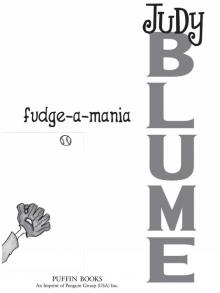 Fudge-a-Mania
Fudge-a-Mania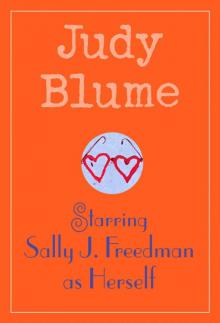 Starring Sally J. Freedman as Herself
Starring Sally J. Freedman as Herself Blubber
Blubber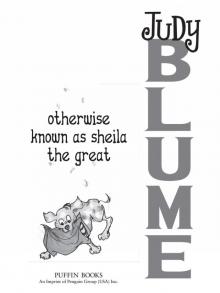 Otherwise Known as Sheila the Great
Otherwise Known as Sheila the Great Are You There God? It's Me, Margaret
Are You There God? It's Me, Margaret Wifey
Wifey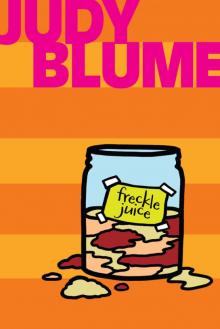 Freckle Juice
Freckle Juice Just as Long as We're Together
Just as Long as We're Together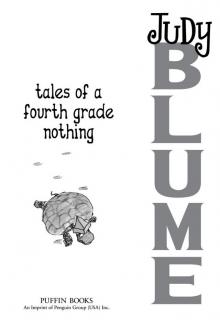 Tales of a Fourth Grade Nothing
Tales of a Fourth Grade Nothing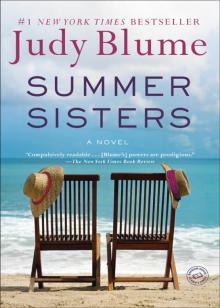 Summer Sisters
Summer Sisters Then Again, Maybe I Won't
Then Again, Maybe I Won't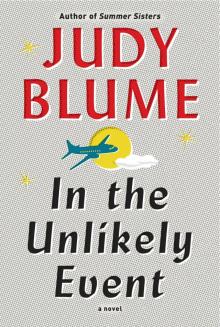 In the Unlikely Event
In the Unlikely Event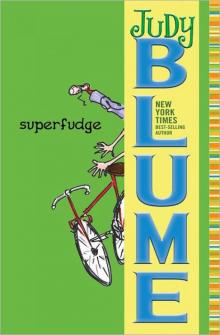 Superfudge
Superfudge Forever . . .
Forever . . .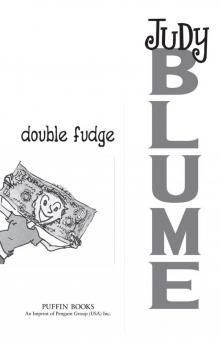 Double Fudge
Double Fudge BFF*
BFF* Smart Women
Smart Women It's Not the End of the World
It's Not the End of the World Going, Going, Gone! with the Pain and the Great One
Going, Going, Gone! with the Pain and the Great One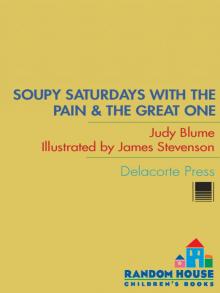 Soupy Saturdays with the Pain and the Great One
Soupy Saturdays with the Pain and the Great One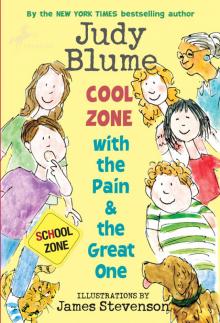 Cool Zone with the Pain and the Great One
Cool Zone with the Pain and the Great One Iggie's House
Iggie's House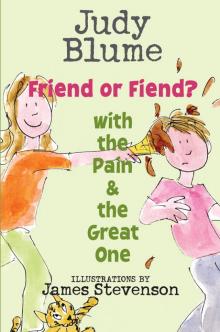 Friend or Fiend? with the Pain and the Great One
Friend or Fiend? with the Pain and the Great One